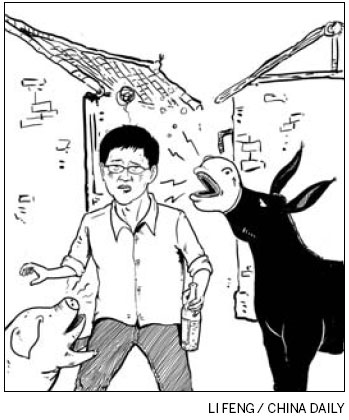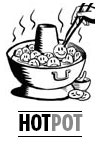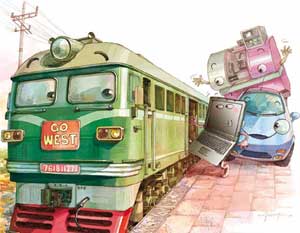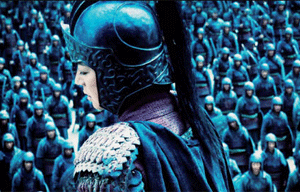Getting a handle on rural China's baijiu culture
Updated: 2011-10-20 07:55
By Sun Li (China Daily)
|
|||||||||

I had long heard that drinking rituals in China's rural areas are fiercer than in the cities and that a dinner awash in bottoms-up toasts is how villagers show their hospitality and make friends.
It is considered inappropriate and rude to refuse these toasts.
Although this knowledge made many of my friends, who are averse to drinking alcohol, uncomfortable on the first night of our visit to a small village in Yan'an, Northwest China's Shaanxi province, I wasn't unduly worried knowing I could handle a couple of bottles of beer.
But I started to have second thoughts after I used the toilet in a local farmhouse.
It was a pitch black night and I did not notice a donkey locked up in a pen near the toilet. Its raspy, discordant hee-haw caught me completely off guard.
As I answered the call of nature, another noise came from somewhere close to me, freaking me out again. It turned out to be a pig, which was observing me from a nearby sty.
 |
I felt thoroughly crept-out and told myself I would drink as little as possible to avoid having to take a leak quite as often.
As expected, we were given a welcome dinner by the village head. Even as I approached the table, I started to cringe.
Instead of beer, it was baijiu, or Chinese white liquor, a sorghum-based spirit known for its fiery kick, that was placed there.
Here is how the etiquette works: When someone comes to raise a toast with you, you should first finish the glass of baijiu in front of you, and then refill the glass and do a bottoms-up with him. This effectively means, he drinks once while you have to do two shots.
I paid my respects to the host by drinking the first glass of baijiu. Soon my stomach started to burn.
"Sorry, I've never had so much alcohol before and I cannot drink any more," I explained to the village head, letting out a forced cough to make him believe me.
"Well, you know the old adage of 'when in Rome'. Come on, you should try. In the name of our friendship," the man said.
After a few rounds of negotiations, he still wouldn't let me go, although he agreed to my using a smaller cup.
To break out of the embarrassing impasse, I relented. Later, I placed my elbows on the table and pretended to be asleep.
But the locals were not so easily thrown off. They would "wake" me up every now and then to raise a toast.
To protect myself and to deal with this aggressive politeness, I sometimes took a sip of the alcohol but did not swallow it. On the pretext of using the toilet, I would spit it out.
When the eyes were off me, I would also replace the baijiu in my cup with water and fake an expression of agony when drinking it.
Several friends, who were more familiar with this culture, adopted a similar approach to avoid becoming intoxicated and looking silly.
Unfortunately, two of my roommates happened to be newcomers to these rituals.
One of them looked terribly flushed from drink and had slurred speech; the other puked right in front of the villagers, who actually applauded him and then spared him by treating him to a cup of warm tea.
Looking at our dizzy state and unsteady gait, the village head said with a satisfying smile: "Don't do anything but have a sound sleep tonight."
I guess no one from my team slept well that night.
One of my roommates went out to throw up now and then, while the other tossed about in bed, saying silly things.
As for me, I was probably the only one who could remember how many times the donkey suddenly belted out its weird tunes that night.











